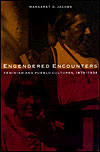 |
Engendered Encounters
Feminism & Pueblo Cultures, 1879-1934
"What marks this [book] as exemplary is the way in which Jacobs has woven what were long scattered and loose threads into a larger and rich narrative tapestry. . . . This is an important contribution to the new Western history, to the history of gender in the U.S., and to the emerging fields of cultural and postcolonial studies."—Ramón A. Gutiérrez, author of When Jesus Came, the Corn Mothers Went Away. In this interdisciplinary study of gender, cross-cultural encounters, and federal Indian policy, Margaret D. Jacobs explores the changing relationship between Anglo-American women and Pueblo Indians before and after the turn of the century. During the late nineteenth century, the Pueblos were often characterized by women reformers as barbaric and needing to be "uplifted" into civilization. By the 1920s, however, the Pueblos were widely admired by activist Anglo-American women, who challenged assimilation policies and worked hard to protect the Pueblos’ "traditional" way of life. Deftly weaving together an analysis of changes in gender roles, attitudes toward sexuality, public conceptions of Native peoples, and federal Indian policy, Jacobs argues that the impetus for this transformation in perception rests less with a progressively tolerant view of Native peoples and more with fundamental shifts in the ways Anglo-American women saw their own sexuality and social responsibilities. Margaret D. Jacobs is an assistant professor of history at New Mexico State University.
328 pp ~ illustrated — ©1999
|

